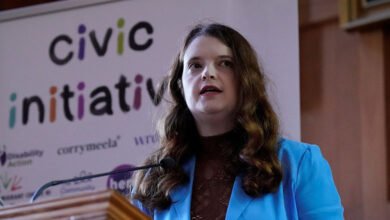Noel Williams bows out
 Tackling fuel poverty must be prioritised and just one department should deal with energy, Noel Williams tells Owen McQuade as he looks back at his time with EST.
Tackling fuel poverty must be prioritised and just one department should deal with energy, Noel Williams tells Owen McQuade as he looks back at his time with EST.
“We definitely need to do more on fuel poverty. I would like to see it eradicated but it’s a tall order,” remarks Williams.
The problem has got “markedly worse” over recent years, he observes, but he is hopeful that the DSD’s new fuel poverty strategy will “make inroads”. The price of energy, income levels and energy efficiency are the three main issues to tackle.
Williams has been Head of the Energy Saving Trust (EST) in Northern Ireland for seven years but is now moving on. His responsibilities included maximising the effectiveness of EST’s programmes and overseeing its long-term strategy in Northern Ireland, as well as dealing with the effects of climate change and reducing greenhouse gas emissions and fuel poverty.
He had to take an interest in energy during his time as Operations Director for military airfields in North Yorkshire when he employed an energy manager to cut back on energy costs in the airfields. But it was when he moved back to Carrickfergus that he decided to turn his experience into a career and took up the position as Head of the Energy Saving Trust in Northern Ireland.
Looking back, one of the things where Williams would like to see change is the way that energy is dealt with by the Assembly.
“I noticed back then in my research that there are seven departments with a finger in the pie of energy,” he comments. However, his counterpart in Wales liaises with a sustainability and housing department, while his counterpart in Scotland deals directly with one department in the Scottish Government.
Challenge
Energy needs “dedicated, cross- departmental work”, he argues, and this will be “a challenge” for the new Assembly.
“The arrival of the new Assembly was tremendous, in my opinion. You could access your local politicians, and all of them were in accord that there was a problem with energy issues, a major problem with fuel poverty and that more had to be done.”
Another of Williams’ priorities is the regulation of the oil industry. “In the past, DETI and the Utility Regulator have said they are ‘not minded’ to regulate oil. However, I do think as a minimum they should be regulating the safety standards,” he comments.
There is currently no regulation and because of this there are many “unbelievable” cases of poor safety standards, he remarks.
An enhanced partnership between the EST and other organisations will be of considerable benefit, argues Williams, and previous initiatives such as a joint television campaign with the Housing Executive have been “extremely beneficial”.
“You could view the Housing Executive as a huge housing association and I saw the value in partnering with them and working closely together,” he comments.
While there is still significant work to be done, Williams says some progress has already been made. When he started his work with EST there was only a very basic form of advice provided through advice centres but this has developed and expanded over the years.
“We’ve since moved on,” he explains. “We had the Sustainable Energy Network [SEN] pilot and there were three of those in the United Kingdom. One in the north east of England, one in East Anglia and I worked very hard to get one of the pilots here in Northern Ireland.”
The results of these showed that the Northern Ireland pilot had been the most successful, he notes.
The work of SEN was undertaken in partnership with three Energy Efficiency Advice Centre providers: Foyle Energy in Derry, WREN in Fermanagh and the Belfast Energy Agency. The three agencies dealt with smaller contracts but eventually joined together to form a single agency, namely the Northern Ireland Energy Agency, which delivered the energy advice facility.
“There was further development where they had proved the concept so we moved onto the EST advice centre [ESTAC] which embraced renewable advice, transport advice and waste advice. So the concept was proved and it was rolled out right across the UK,” comments Williams.
Enhancing the profile of the EST was one of his priorities when he took up his position. He thinks the profile is “where it’s ought to be” now.
“Most people in Northern Ireland will be aware of the EST and they will know that it is a trusted bridge between the Government, the supplier and the householder,” he says.
Williams has been asked to remain as Chair of the Fuel Poverty Advisory Group and says: “I’m not ready to hang my boots up yet”. He is running as an Alliance councillor in the Carrick Castle area of Carrickfergus Borough Council but states that he hasn’t “looked any further afield than that at present”.






